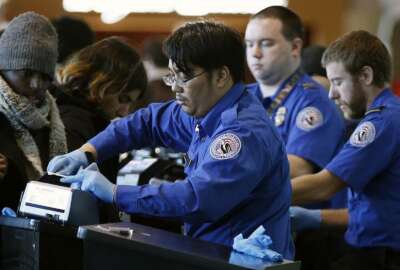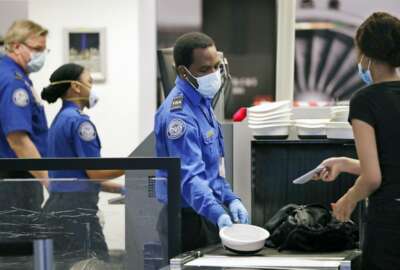
TSA chief says pay equity his top priority as TSO bill awaits Senate action
TSA is confronting turnover challenges as air travel approaches pre-pandemic levels.
The head of the Transportation Security Administration says achieving pay equity for TSA’s screening workforce is his top priority if he’s re-confirmed to lead the agency.
TSA needs 10% more airport screening officers than it currently employs, according to Administrator David Pekoske. The deficit comes as air travel has surged back to pre-pandemic levels.
Pekoske has been TSA’s administrator since 2017, and in February, President Joe Biden announced he was nominating the retired Coast Guard vice admiral for a second five-year term.
“The number one thing for me as the administrator and, if confirmed, into the next five years is fixing this pay issue because it’s critical for us,” Pekoske said during a confirmation hearing held by the Senate Committee on Commerce, Science and Transportation on Wednesday. “We won’t be able to staff if we don’t get pay adjusted.”
To address the increased demand for airport screening, Pekoske said TSA has introduced various incentives, including recruiting bonuses, localized cost-of-living increases, and summer overtime bonuses. He also said about 1,000 transportation security officers recently volunteered to relocate to understaffed airports.
But TSA typically faces 20% staff turnover every year, according to Pekoske. He said the agency’s low pay compared to the rest of the federal workforce is the main problem when it comes to hiring and retaining transportation security officers. TSA officers are generally paid about 30% less than their counterparts at other federal agencies.
“It’s very, very hard for us to recruit people because they’re looking at the pay system,” he said. “Even if we can recruit them, they’ll decide to come into TSA sometimes and then transition to another agency.”
That also bears out in the Partnership for Public Service’s 2021 “Best Places to Work” report released Wednesday. The agency’s 48.3 employee engagement and satisfaction score ranks 426 out of 432 sub-departments and agencies across government. The latest score is a step back for TSA after it jumped to 53.4 in last year’s report.
TSA received particularly low ratings for pay satisfaction, with its 28.5 score ranking 427th out of 428 departments ranked in that category. Employees also expressed dissatisfaction with how the agency has handled COVID-19 from both leadership and employee well-being perspectives, respectively.
To remedy the salary issue, TSA’s fiscal year 2023 budget request includes funding for a “pay equity plan” that would provide an average 30% increase in base pay for transportation security officers and an average 20% increase in base pay for federal air marshals. The White House is proposing to offset the $1.5 billion increase to TSA’s budget through a legislative proposal that would allow the agency to keep all of the passenger security fees it collects, rather than sending a portion to the U.S. Treasury to reduce the federal deficit.
Meanwhile, in May, the House passed the Rights for the TSA Workforce Act. The bill would bring 60,000 TSA employees under the same personnel system as other federal employees. That includes full collective bargaining rights, access to an independent third party for dispute resolutions and the General Schedule pay system.
But the bill passed the House with almost no Republican support, and a similar split could present a roadblock in the Senate, where bills typically need at least 60 votes to get passed.
The commerce committee is now considering whether to move forward with the legislation. During the hearing, GOP members of the committee echoed House Republican concerns about bringing TSA employees under the Title 5 personnel system and granting them full collective bargaining rights.
“The General Schedule is a 70-year-old classification and compensation system for the last century, and is the subject of countless studies and recommendations from good government organizations who consistently find it is too inflexible to meet the needs of 21st century workforce,” Ranking Member Roger Wicker (R-Miss.) said. “A better course of action is to use existing [Aviation and Security Transportation Act] flexibility to improve TSA’s pay system so that it operates at a level superior to the GS system.”
Sen. Marsha Blackburn (R-Tenn.) also told Pekoske she was “disappointed” that he now supports collective bargaining for TSA employees after he previously declined to support it.
But Pekoske said his experience over the last five years has convinced him expanding collective bargaining is the right path for TSA. The agency is also seeking an additional $120 million in fiscal 2023 to help manage a workforce with full collective bargaining rights.
“I’ve paid very, very close attention to our Federal Employee Viewpoint Survey results. That needle hasn’t moved where it needs to move to,” Pekoske said. “And I think we need to try a different approach to this.”
Copyright © 2024 Federal News Network. All rights reserved. This website is not intended for users located within the European Economic Area.
Follow @jdoubledayWFED
Related Stories




